How to choose a point-of-sale system that’s right for your industry
By Abby Quillen
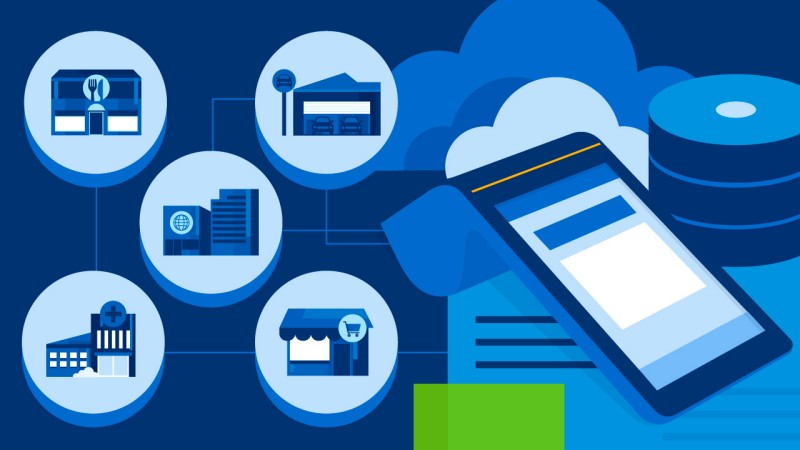
Investing in a point-of-sale (POS) system can help your business increase sales, improve customer service, save time, and more. But not all POS systems are the same, and choosing the best system for your business can be overwhelming. Since POS systems offer specialized features tailored to specific industries, it’s a good idea to start by considering what you need for your sector.
This guide will help you understand industry-specific POS features and integrations suited for restaurants, grocery stores, healthcare facilities, automotive shops, and enterprise businesses. But first, let’s take a closer look at what a POS system is and why different industries need different POS systems.
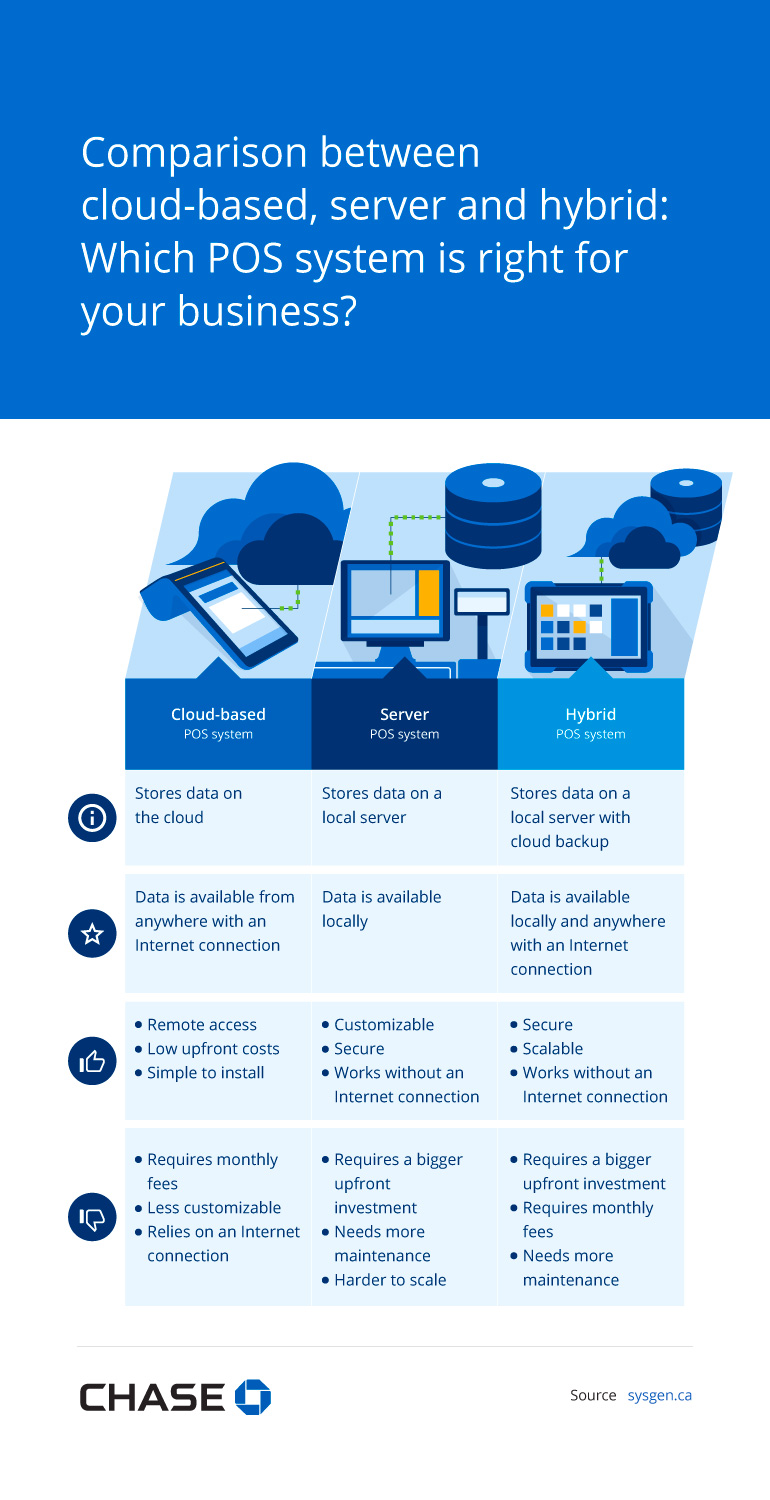
| Cloud-based POS system | Server POS system | Hybrid POS system | |
|---|---|---|---|
| Description | Stores data on the cloud |
Stores data on a local server |
Stores data on a local server with cloud backup |
| Key feature |
|
|
|
| Pros |
|
|
|
| Cons |
|
|
|
Source:
What’s a POS system?
A POS system is where customers make purchases. Traditionally, a POS system was just a cash register. But today, these systems encompass both software and hardware. The primary hardware typically includes a payment terminal that hosts the POS software. This POS terminal could be a specialized device, desktop computer, or mobile device. Depending on the system, additional hardware can include a monitor, barcode scanner, card reader, receipt printer, or cash register.
Most modern POS systems are cloud-based, meaning they store data online. Cloud-based POS systems provide employees with instant, anywhere access to tools and information. But you can also opt for a POS system that stores data on a local server (an on-site computer or device). Server POS systems typically require a more extensive installation process but are more secure and can function without the Internet. Hybrid POS systems offer the benefits of both a cloud-based and server POS system.
Regardless of the setup, most systems do more than the traditional cash registers of times past. These robust systems help businesses do the following:
- Manage checkout
- Securely process sales and payments
- Monitor inventory
- Gather data
- Integrate with sales software, a customer relationship management (CRM) platform, and marketing software
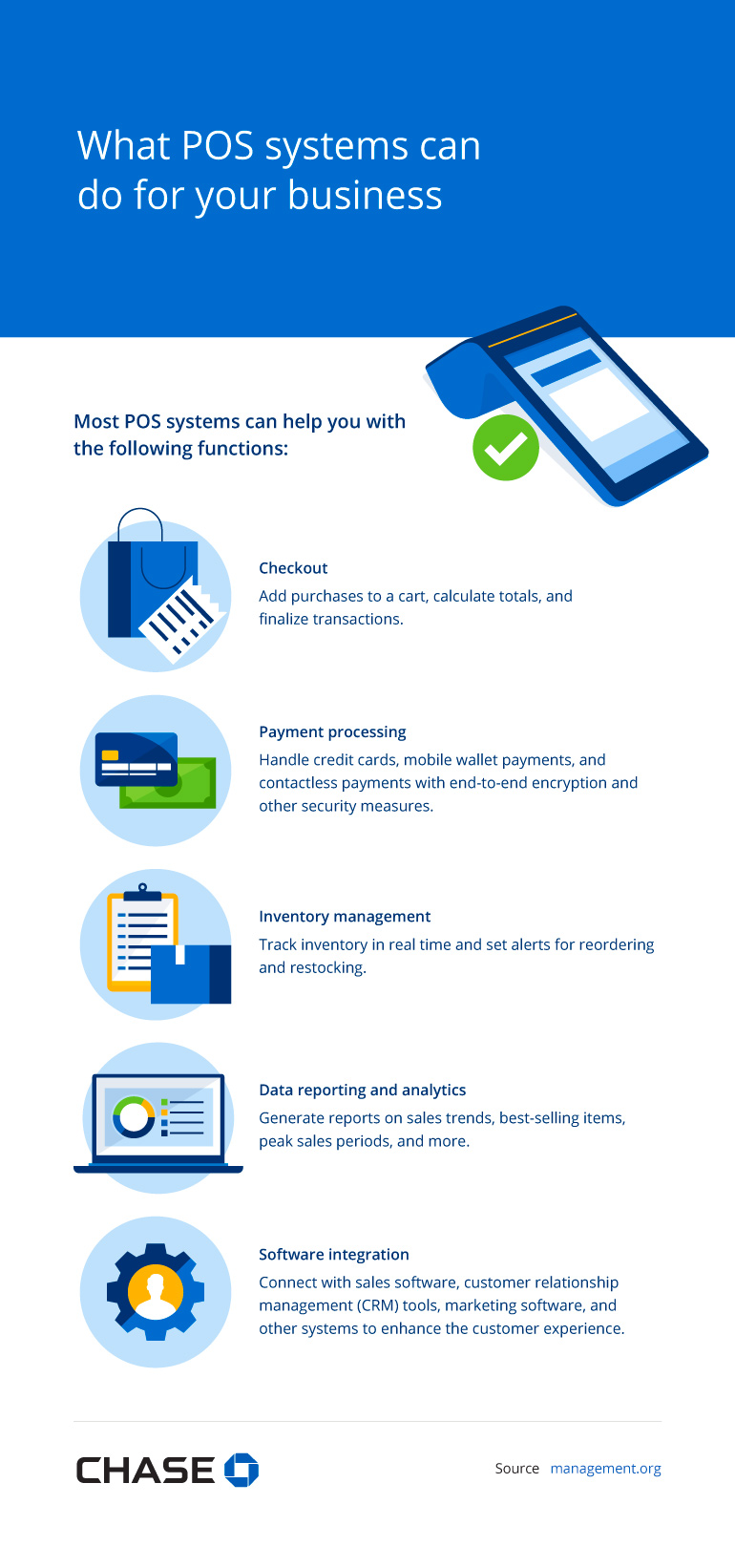
Most POS systems can help you with the following functions:
- Checkout
Add purchases to a cart, calculate totals, and finalize transactions. - Payment processing
Handle credit cards, mobile wallet payments, and contactless payments with end-to-end encryption and other security measures. - Inventory management
Track inventory in real time and set alerts for reordering and restocking. - Data reporting and analytics
Generate reports on sales trends, best-selling items, peak sales periods, and more. - Software integration
Connect with sales software, customer relationship management (CRM) tools, marketing software, and other systems to enhance the customer experience.
Source:
Why businesses in different industries may need different POS systems
While POS systems benefit many sectors, they aren’t one-size-fits-all solutions. Here’s why different industries need unique POS systems.
Industry-specific features
Different sectors require special POS system functionalities. To understand why, consider how a traditional restaurant's ordering and payment needs differ from those of a retail store. Restaurants must split checks and accept tips, while retail stores may need robust inventory and customer management features.
Integration capabilities
Merchants benefit from POS system integration with various software, including customer relationship management, accounting, and loyalty program software.
Compliance requirements
Some industries, including health care and automotive, must comply with strict regulatory frameworks and standards, especially regarding privacy. These industries need POS systems that ensure data security and confidentiality.
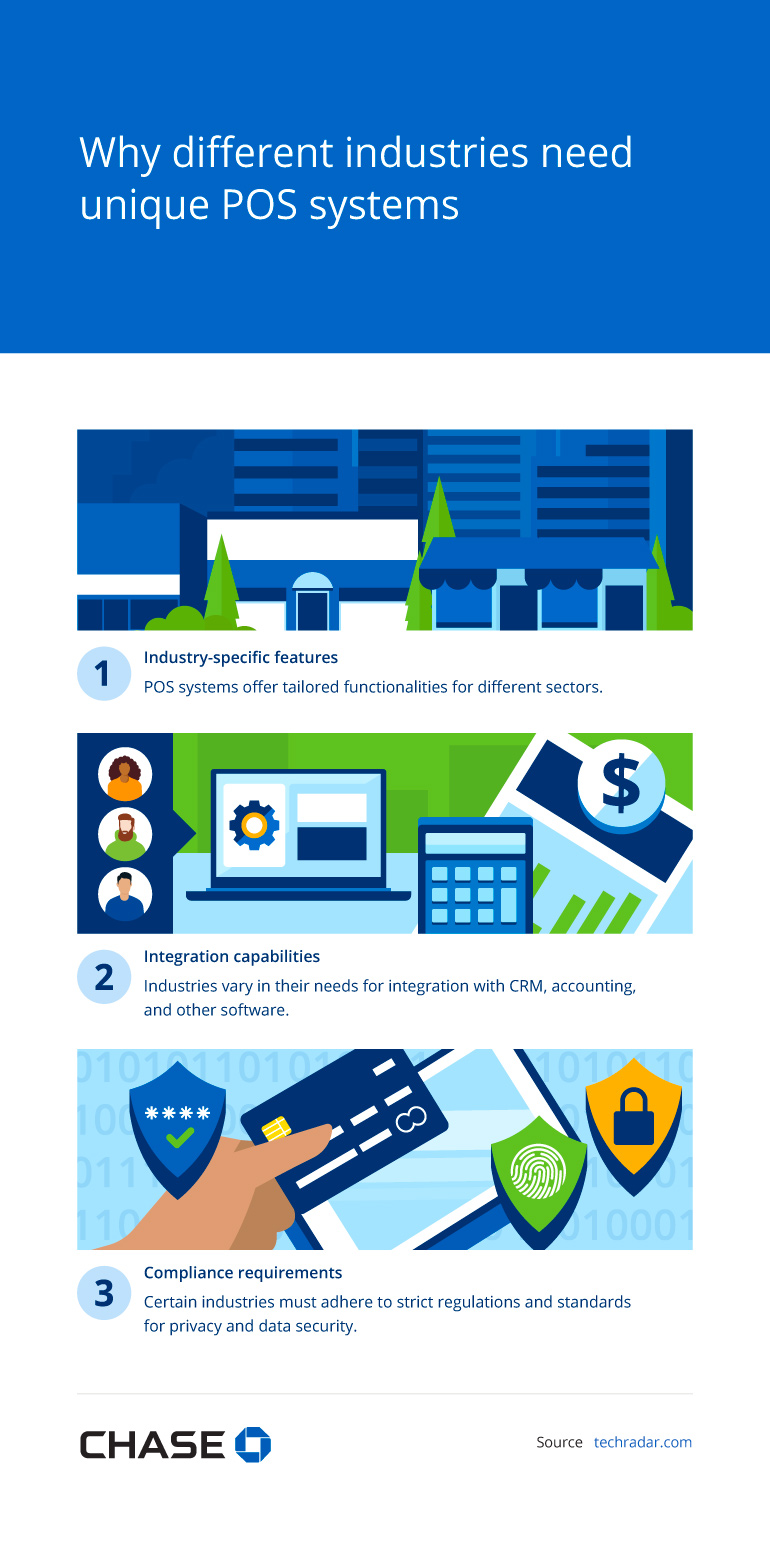
- Industry-specific features
POS systems offer tailored functionalities for different sectors. - Integration capabilities
Industries vary in their needs for integration with CRM, accounting, and other software. - Compliance requirements
Certain industries must adhere to strict regulations and standards for privacy and data security.
Source:
Industries that benefit from POS systems
POS systems can save considerable time and streamline operations for many industries. These five sectors can especially benefit from investing in a POS system.
Restaurants
In the fast-paced restaurant industry, a good POS system is essential. The right system can help you manage front-of-house and back-of-house operations to increase sales, reduce wait times, increase loyalty, improve the accuracy of orders, and deliver better customer service. In short, a POS system can help your customers walk away feeling delighted with every part of the dining and payment experience. Depending on the type of restaurant you run, the POS features you need will vary.
Restaurant POS and restaurant franchise POS systems
A user-friendly interface, powerful security, and scalability are essential for a restaurant POS system. Restaurants may benefit from these POS features and integrations:
- Flexible payment options, including mobile, contactless, and gift cards
- Tip payments
- Bill splitting
- Mobile tableside ordering and payments
- Kitchen display system
- Digital receipts
- Inventory management
- Online ordering
- Menu management
- Table management
- Employee scheduling
- Reservation and waitlist management
- Sales reporting
- Loyalty program integration
Fast-casual POS, fast-food POS, or fast-food franchise POS systems
Speed, durability, and a user-friendly interface are critical at these restaurants. These POS features and integrations may be beneficial:
- Flexible payment options, including mobile, contactless, and gift cards
- Inventory management
- Online ordering
- Order ahead/pickup options
- Loyalty program integration
- Menu management
- Employee scheduling
- Touchscreen terminals
- Self-ordering kiosks
- Sales reporting
Grocery stores
Choosing the right POS system can help grocery stores keep shelves well stocked, ensure secure payments, move customers through lines quickly, and facilitate curbside pickup and delivery. Consider these helpful features and integrations for a grocery POS system:
- Flexible payment options, including mobile, contactless, and gift cards
- Barcode scanning
- Age verification (for alcohol and tobacco purchases)
- Inventory management
- Online ordering
- Multichannel capabilities (which allow businesses to sync online and in-store sales data to create a unified view of inventory, orders, and customer information)
- Loyalty program integration
- Self-checkout kiosks
- CRM integration
- Real-time sales reporting
Healthcare facilities
Provincial healthcare plans cover medically necessary services in Canada. But many healthcare facilities need a medical POS system to accept out-of-pocket payments for supplementary and non-covered services, such as elective and cosmetic procedures, dental services, and physical therapy. Plus, many facilities must accept payments from patients not covered by provincial insurance, including new immigrants, permanent residents, international students, and temporary foreign workers.
Privacy and security are paramount in health care. POS systems need to comply with the federal Personal Information Protection and Electronic Documents Act (PIPEDA) and relevant provincial health-related privacy laws like the Personal Health Information Protection Act (PHIPA) in Ontario and the Personal Information Protection Act (PIPA) in British Columbia. Alongside strong data encryption, which is a critical feature to protect personal data, consider these beneficial features and integrations for medical POS systems:
- Flexible payment options, including mobile, contactless, and gift cards
- Payment plans, including prepaid options
- Provincial health card verification integration
- Electronic health record (EHR) integration
- Insurance and billing integration
- Inventory management (to track medical supplies)
- Appointment scheduling and management
- Detailed financial reporting
Automotive shops
A good POS system can help automotive shops streamline operations, automate administrative tasks, track inventory, and more. POS system needs differ depending on the type of auto shop. Consider these helpful features and integrations for an auto repair or auto parts POS system:
- Flexible payment options, including mobile, contactless, and gift cards
- Order management
- Payment plans
- Quote management
- Appointment scheduling
- Billable hours tracking
- Invoicing
- Inventory management
- Customer relationship management integration
- Vehicle record management integration
- Repair order management
Enterprise businesses
A good POS system is essential for large retail operations with many employees, complex structures, and multiple locations. Employees need instant access to real-time inventory, sales, customer information, and data analytics, which a well-equipped POS system provides.
As small- and medium-sized businesses (SMB) evolve into larger enterprises, their POS system must also evolve. At first, companies may prioritize an easy-to-use, cost-effective POS system. But as they scale, they need more sophisticated features. For example, as your business expands into markets with different tax laws, you’ll benefit from a POS system with a value-added tax (VAT) calculator to accurately calculate and apply sales taxes in different provinces and countries. Also, consider these features and integrations for enterprise POS systems:
- Sales management
- Inventory management
- Ordering management
- CRM integration
- Reporting and analytics data
- Employee management
- Currency conversions
- Multichannel capabilities
- Loyalty program integration
- Email marketing integration
- Warehouse management integration
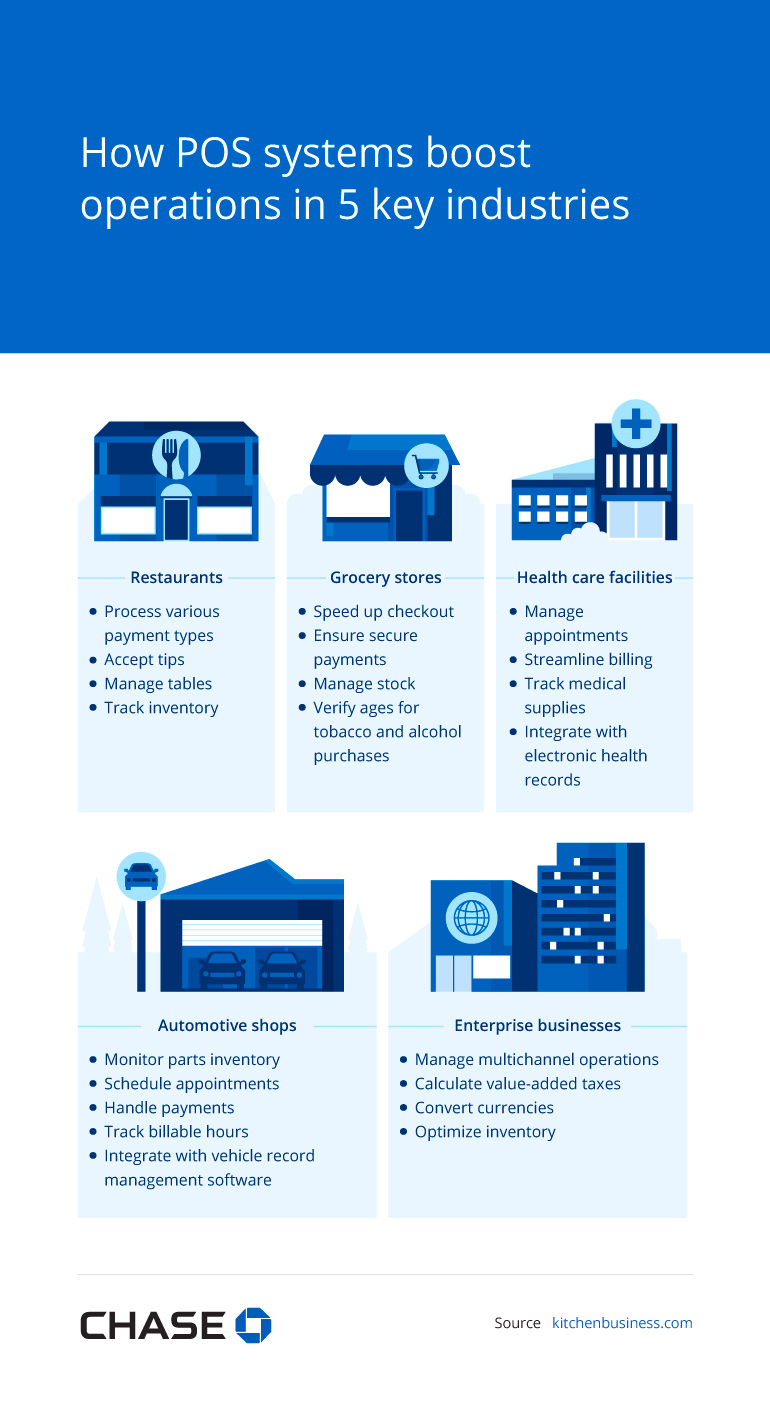
- Restaurants
- Process various payment types
- Accept tips
- Manage tables
- Track inventory
- Grocery stores
- Speed up checkout
- Ensure secure payments
- Manage stock
- Verify ages for tobacco and alcohol purchases
- Health care facilities
- Manage appointments
- Streamline billing
- Track medical supplies
- Integrate with electronic health records
- Automotive shops
- Monitor parts inventory
- Schedule appointments
- Handle payments
- Track billable hours
- Integrate with vehicle record management software
- Enterprise businesses
- Manage multichannel operations
- Calculate value-added taxes
- Convert currencies
- Optimize inventory
source:
Conclusion
It’s not an overstatement to say that a POS may be your company's most important investment. The right POS system can help you create a product catalogue, manage sales, supervise employees, and more. When shopping for a POS system, consider whether it has features and integrations tailored to your industry. Check out our 2024 State of Canadian Payments report for additional insights to guide your decision-making.
Whether you manage a restaurant, grocery store, healthcare facility, automotive shop, or enterprise company, choosing a capable and reliable POS system can help your business grow and thrive. Contact us to discuss our Chase POS solution.